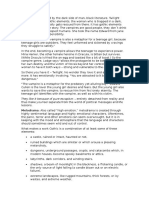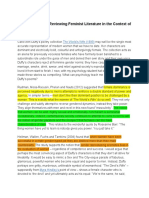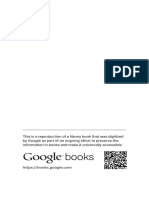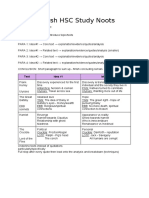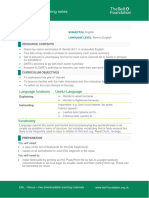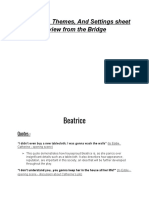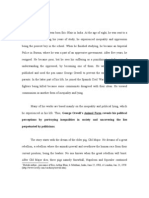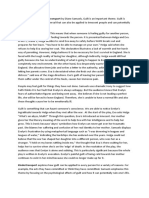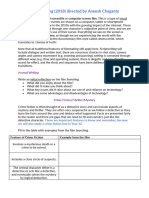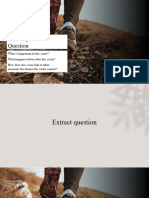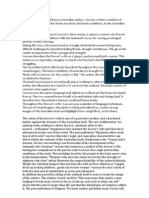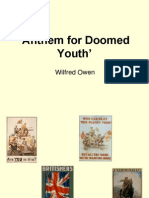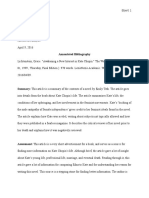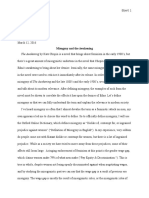The Suffrage of Kate Chopin As Edna in The Awakening: Ebert 1
The Suffrage of Kate Chopin As Edna in The Awakening: Ebert 1
Uploaded by
Matthew EbertCopyright:
Available Formats
The Suffrage of Kate Chopin As Edna in The Awakening: Ebert 1
The Suffrage of Kate Chopin As Edna in The Awakening: Ebert 1
Uploaded by
Matthew EbertOriginal Description:
Original Title
Copyright
Available Formats
Share this document
Did you find this document useful?
Is this content inappropriate?
Copyright:
Available Formats
The Suffrage of Kate Chopin As Edna in The Awakening: Ebert 1
The Suffrage of Kate Chopin As Edna in The Awakening: Ebert 1
Uploaded by
Matthew EbertCopyright:
Available Formats
Ebert 1
The Suffrage of Kate Chopin as Edna in The Awakening
Kate Chopin gives us an amazing novel that brings enlightenment to the suffrage of women in
the late 1800s. In The Awakening, we can see Kate impose traits of her life upon the characters
in the novel and through this we can see her feelings toward the subjects in which she is writing.
The subjects in which she is awakening her audience are the misogynistic roles placed upon
women and men and how they affect the lives of those around them, suicide, love, and
homosexuality. As Kate writes on these subjects she is rebelling against the norm of the 1890s
and trying to convince her readers of how absurd their society is, because of this her novel was
negatively reviewed and widely shunned in her time. Lets begin discussing how she sets this up.
Kate develops her characters through multiple events of her life. The first is the easiest to
spot, Edna. She creates Edna from herself, a New Orleans wealthy socialite, who would vacation
at the Grand Isles. The descriptions of Edna also mirror those of Kate given during her time.
Kates husband, Oscar, has many commonalities with Leonce, Ednas husband, but he was not of
the same temperament. Oscar allowed Kate to be free, while Edna was controlled by Leonce.
The similarities begin when Enda awakens and begins to ask for more freedom, Leonce, through
the advice of Dr. Mandelet, backs off the traditional role and assumes an Oscar-like mentality
towards Edna (Chopin 101-102). This brings about condemnation from the Colonel later in the
novel that would have been similar to those aimed at Oscar in Kates life. Another interesting
character is Robert Lebrun who seems to have been created from Kates friendship with Edgar
Degas. Despite there being no evidence of a romantic relationship between Edgar and Kate, they
seem to have been close during the short time he was in New Orleans. The final character that I
wish to bring up is Alcee, the man with whom Edna has her affair. After the death of Oscar, Kate
ventured into an affair with a handsome man, Albert Sampite, this man can be seen as Alcee in
Ebert 2
the novel. "But Albert Sampite, even if he had been single, was not her match" (Toth 98). This is
just like Ednas relationship with Alcee in The Awakening. Interestingly, in describing her affair
Toth gives a nice insight on Edna and Roberts penultimate moments, "Among Catholics there
was no divorce; under Louisiana civil law, if a divorce took place because of adultery, 'the
offender may not marry his or her accomplice'" (98). In this we can see that had Edna left Leonce
for Robert they could not have married. Advice givers believed the reasons for the changes to
the American family were the result of women's "selfish desires" to pursue opportunities away
from the home and a devaluation of the role of motherhood and housewife. In response, images
of devoted wives and mothers were featured in numerous advice magazines ("The Role of the
Wife and Mother."). This shows that if a divorce were to occur in this era, it was the fault of the
woman, therefore, this lends Kate to write Edna onto a path of final freedom from the bonds of
society through her own demise. Before we describe the penultimate moment of Edna, lets look
at Kates life and the challenges they present to her readers through the book.
Kate and Oscar had a really good relationship, Kate was free of any duties and
responsibilities, and treated well by Oscar. I am going to be married, Kate confided in her
commonplace book, married to the right man. It does not seem strange as I had thought it
wouldI feel perfectly calm, perfectly collected. And how surprised everyone was, for I had kept
it so secret! (Biography). Oscar had often been criticized about Kates activities, much in the
way that Leonce was allowing Edna to be free, but worried about the perception. "Oscar was a
rare man who preferred an original woman, one who was neither quiet nor stay-at-home" (Toth,
Unveiling Kate Chopin 67). It seems that through this loving and engaging relationship Kate and
Oscar experienced some hardships from the social norms of her time. These hardships are
personified in The Awakening through the inclusion of Ednas father.
Ebert 3
The most influential example from Kates life would be Ednas father, the Colonel, giving
advice to Leonce on how to control his wife. In Kates life, the Colonel doesnt reflect her father,
as some might think. Instead, I believe the Colonel more closely resembles Oscars father, who
was almost a carbon copy of the Colonel. As Emily Toth describes him in her biography, "Dr.
Chopin settled down as the master of a plantation, where he made the lives of his wife and slaves
a living hell" (63). This is a rather interesting analysis because not many people see this, but Dr.
Chopin and Kate had a rough relationship but had a mutual liking to each other, in much the
same way Edna and the Colonel had a mutual moment in the novel. Through this we can see that
Oscars tendency to allow Kate to be an independent woman did not sit well with his father who
probably gave the same advice that the Colonel gave to Leonce in the novel. Writing about it is
Kates way of showing how stupid of an idea it is to entrap women as property, but when
someone doesnt conform to this notion, theres a societal push for them to re-establish the
norms. This societal push of misogyny upon men, who didnt play the role, was wrong and drove
Kate nuts, as she would have been victim to this pressure during her marriage to Oscar.
The second case of misogynistic theme that we see that probably happened with Kate is the
character of Robert Lebrun. Robert is loosely based upon the painter Edgar Degas, who had a lot
of influence on The Awakening. From 1872 to 1873, Degas made an extended trip to New
Orleans to visit his brother Ren and other family members, including his uncle, who operated a
failing cotton exchange (Wolf). As an outsider in New Orleans, much like Kate and Edna, hed
have been a good confidant for Kate. Its interesting that his family operated a cotton exchange,
as it was the same business that Oscar had been involved. Through Robert, we can see that Kate,
as Edna had, was close to Degas, but was never seen as a subject of affection. "[Degas] was also
considered rather asexual, and therefore no threat to the husbands of women he might
Ebert 4
meet" (Toth 73). Perhaps Kate had developed a love with Degas that extended beyond the normal
love of friends, but much like Robert had in The Awakening, Degas was unable to return that
love. This is purely speculation, but an observation is that Robert had many tendencies of a
homosexual man of his time. It was frowned upon to openly admit to a character being such at
her time. So many scholars did not label Robert as homosexual, but Emily Toth writes,
"homosexual male Americans frequently went to Mexico for sexual alliances with boys" (Toth
213). Whereas had it been allowed, Robert would have just admitted to being homosexual and
been free to express himself, rather than being overly flirtatious with women in an attempt to
seem normal. This is still a common idea in the homosexual community as homosexual men
generally have close relationships with women, but its purely platonic in nature.
Through the character Leonce we can see a lot of the social ideas of the time. Leonce was
seen as the perfect husband, a wealthy man who conforms to the established model male. This
male was expected to control his wife, much like the advice given to Leonce from the Colonel,
Authority, coercion are what is needed. Put your foot down good and hard; the only way to
manage a wife (Chopin 109). Emily Toth writes that at this time it was even acceptable for men
to batter their wives, as it was seen as a right but Oscar has never been one to condone such
activities (Toth 99). Doing extra research has shown that this is indeed true, The AngloAmerican common law originally provided that a husband, as master of his household, could
subject his wife to corporal punishment or "chastisement" so long as he did not inflict permanent
injury upon her (Siegel 2118). During Kates time this notion had been challenged and changed,
but was not enforced. Therefore, in writing about the old advice of the Colonel, we can see Kate
pushing back against the old ideas and challenging people to progress into the new.
Ebert 5
Kate had an interesting view upon motherhood, in the novel she seems to make it seem like
its a weight bearing down on the soul as expressed in the following passage, The children
appeared before her like antagonists who had overcome her; who had overpowered and sought to
drag her into the souls slavery (Chopin 176). It doesnt seem like Kate always held this believe
about being a mother. As Emily Toth quotes Chopins diary,
the smell of chloroform, and then waking at 6 in the evening from out of a stupor to see
in my mothers arms a little piece of humanity all dressed in white which they told me was
my little son! The sensation with which I touched my lips and my fingertips to his soft
flesh only comes once to a mother. It must be the pure animal sensation: nothing spiritual
could be so real so poignant (Toth 69).
Here we see that Kate was ecstatic about child birth and felt a sensational attraction to her
children. But later when describing childbirth in The Awakening her words are much different.
"An ecstasy of pain, the heavy odor of chloroform, a stupor which had deadened sensation, and
an awakening to find a little new life to which she had given being added to the great
unnumbered multitude of souls that come and go" (Chopin 169). Chopin also describes this as,
a scene of torture (169). This last bit is given some contextual insight from Toth, "American
and English physicians (all male) had resisted using the drug [chloroform], arguing that women
should 'bring forth children in sorrow,' as the Bible ordered" (Toth 69). From this we can see that
men imposed their will upon the womanliest thing of the era, childbirth. It is my opinion here
that Kate isnt pushing against childbirth, but rather pushing against the torture that men impose
upon women in childbirth. Kate wanted women to give birth in their own manner, not in a
manner decided by a male doctor. Through this bit of insight, she was challenging her readers
about who should be in charge of childbirth.
Ebert 6
The penultimate challenge in the novel is the suicide of Edna. At the time of the writing, it
was understood that suicide was a problem amongst socialite women. Kate has a very strong
opinion on the notion that only women commit suicide as described in the following passage;
Business men commit suicide every day, yet we do not say that suicide is epidemic in the
business world. Why should we say the feeling is rife among society women, because half a
dozen unfortunates, widely separated, take their own lives? (Toth, "Kate Chopin On Divine
Love And Suicide 120). Here we see Kate going straight after the notion that women are the
only ones who commit such a pathetic act, and more interestingly she brings about the business
men, who are seen as model citizens. It is through this notion that she is challenging that men
and women are no different. Here shes pushing for equal respect given to women and men who
commit this act. In The Awakening, Edna is seen as a woman who is freed by her suicide. In this
sense Kate is challenging her audience to re-evaluate the notion of suicide, re-evaluate their own
perceptions of socialite women, re-evaluate their perceptions, because what looks sad, morbid,
and pathetic might actually be someones liberation from bondage. In Ednas suicide Kate
challenges the readers to understand the societal bondage applied to women, men, and to
evaluate themselves so that they can remove the oppressions of misogyny, the misogyny placed
upon Oscar because he was too liberal with Kate, the misogyny placed upon childbirth, the
misogyny placed upon marriage and divorce, the misogynistic roles assigned to men, who had to
be manly, in my research this is the true meaning of The Awakening. It is an awakening of the
reader to question their society and the roles being cast upon us. This message is as strong today
as it was when Kate Chopin wrote her novel.
Ebert 7
Works Cited
"Biography." KateChopin.org. Ed. Bernard Koloski. The Kate Chopin International Society,
2016. Web. 30 Apr. 2016. <http://www.katechopin.org/biography/>.
Chopin, Kate. The Awakening and Selected Stories of Kate Chopin. New York: Pocket, 2004.
Print.
Siegel, Reva B., "The Rule of Love: Wife Beating as Prerogative and Privacy" (1996). Faculty
Scholarship Series. Paper 1092.
"The Role of the Wife and Mother." Kate Chopin. Loyola University, 2009. Web. 30 Apr. 2016.
Toth, E. "Kate Chopin On Divine Love And Suicide: Two Rediscovered Articles." American
Literature 63.1 (1991): 115. Academic Search Complete. Web. 16 Apr. 2016.
Toth, Emily. Unveiling Kate Chopin. Jackson: U of Mississippi, 1999. Print.
Wolf, Justin. "Edgar Degas Biography, Art, and Analysis of Works." The Art Story. The Art Story
Foundation, 2016. Web. 30 Apr. 2016. <http://www.theartstory.org/artist-degasedgar.htm>.
You might also like
- Week 1 Discussion 1Document2 pagesWeek 1 Discussion 1api-528608734No ratings yet
- 7 Ruby in The SmokeDocument2 pages7 Ruby in The SmokeAdham DamirNo ratings yet
- DiggingDocument11 pagesDiggingMohammad AjajNo ratings yet
- Othello Act 3 SummaryDocument5 pagesOthello Act 3 SummaryCharvi MishraNo ratings yet
- Mini Saga Competition 2011 PDFDocument54 pagesMini Saga Competition 2011 PDFSayyad ChoonawallaNo ratings yet
- Spies - Key Quotes: Quote Topic AnalysisDocument2 pagesSpies - Key Quotes: Quote Topic AnalysisAnonymous 4e3HiOAOPNo ratings yet
- Twilight The Gothic NovelDocument2 pagesTwilight The Gothic NovelGirlhappy RomyNo ratings yet
- The World's Wife - Reviewing Feminist Literature in The Context of PsychologyDocument3 pagesThe World's Wife - Reviewing Feminist Literature in The Context of PsychologyAlissa ThakkerNo ratings yet
- Charles Glass The Godfather of Bodybuilding First ChapterDocument8 pagesCharles Glass The Godfather of Bodybuilding First Chapterbelal rashad68% (22)
- Notes On Dulce Et Decorum EstDocument4 pagesNotes On Dulce Et Decorum EstronanNo ratings yet
- 9.2.23 Comparison EssayDocument4 pages9.2.23 Comparison EssayJennifer SprattNo ratings yet
- Oliver TwistDocument373 pagesOliver Twistyakamop436No ratings yet
- Narrative HookDocument4 pagesNarrative Hookapi-262506169No ratings yet
- English HSC Study Noots: Essay Model PlanDocument22 pagesEnglish HSC Study Noots: Essay Model PlanJayJayNo ratings yet
- BRAAWMS - Socratic Seminar PreparationDocument6 pagesBRAAWMS - Socratic Seminar PreparationAlen Pereira100% (1)
- Robert GrayDocument3 pagesRobert Grayoiu7hjjs100% (1)
- Hamlet Act 1Document13 pagesHamlet Act 1ArthurNo ratings yet
- Scott Fitzgerald, GatsbyDocument21 pagesScott Fitzgerald, GatsbyMaría Paz Crujeiras100% (1)
- Discussion: His Verse Out Loud / in His Wolfy DrawlDocument3 pagesDiscussion: His Verse Out Loud / in His Wolfy DrawlgshzhvdvdNo ratings yet
- A Doll's House (Ibsen) BackgroundDocument2 pagesA Doll's House (Ibsen) BackgroundAbbey HeNo ratings yet
- How Is Eva Presented in Kindertransport?Document3 pagesHow Is Eva Presented in Kindertransport?Thanya Helena Jasinska100% (1)
- Oedipus The King - Knowledge OrganiserDocument2 pagesOedipus The King - Knowledge OrganiserCarlyNo ratings yet
- Characters, Themes, and Settings Sheet For A VIew From The BridgeDocument13 pagesCharacters, Themes, and Settings Sheet For A VIew From The BridgeAdriThe BestNo ratings yet
- How Does Shakespeare Present Tybalt and Mercutio and How Does He InfluenceDocument4 pagesHow Does Shakespeare Present Tybalt and Mercutio and How Does He InfluenceMichael Sewell100% (3)
- William Shakespeare: King LearDocument12 pagesWilliam Shakespeare: King Learapi-340124451100% (1)
- Animal Farm - Term PaperDocument11 pagesAnimal Farm - Term PaperJobz LazoNo ratings yet
- Born A Crime - Trevor Noah - 10 BDocument28 pagesBorn A Crime - Trevor Noah - 10 Bbereketbekele2026No ratings yet
- Post Modernism in TTTCDocument5 pagesPost Modernism in TTTCapi-520774138No ratings yet
- Department of English and American StudiesDocument47 pagesDepartment of English and American StudiesSandra BotrosNo ratings yet
- Guilt in KindertransportDocument1 pageGuilt in KindertransportVincey LuNo ratings yet
- Animal FarmDocument3 pagesAnimal FarmLaraValdiviesoCegarraNo ratings yet
- Beowulf Menu FinalDocument2 pagesBeowulf Menu Finalapi-518572681No ratings yet
- Comic Relief in Midsummer Night'sDocument2 pagesComic Relief in Midsummer Night'sADRIZNo ratings yet
- Stormcock and ElderDocument2 pagesStormcock and ElderBhai Kabir singh100% (10)
- To Kill A Mockingbird EssayDocument3 pagesTo Kill A Mockingbird Essayguranda1No ratings yet
- Writing Informative or Explanatory Texts English Presentation in Colorful Pastel Doodle StyleDocument12 pagesWriting Informative or Explanatory Texts English Presentation in Colorful Pastel Doodle StyleCher Jess Castro Vales100% (1)
- Death of A Salesman OverviewDocument28 pagesDeath of A Salesman OverviewmspatinoNo ratings yet
- 12 - Speculative FictionDocument4 pages12 - Speculative Fictionapi-297725726No ratings yet
- HSC Skills BookletDocument9 pagesHSC Skills BookletJoshua JohnNo ratings yet
- Searching Study GuideDocument6 pagesSearching Study GuidelozNo ratings yet
- Alarm Paragraph Structure Model Pats CuriousDocument3 pagesAlarm Paragraph Structure Model Pats Curiousapi-331074548No ratings yet
- Lindsey Todd Lord of The Flies Curriculum DesignDocument21 pagesLindsey Todd Lord of The Flies Curriculum Designapi-2173862630% (1)
- Revisions Hedda GabblerDocument25 pagesRevisions Hedda GabblerHanadi DiraniNo ratings yet
- Poetry Unit 2Document7 pagesPoetry Unit 2Vian100% (1)
- Paper 9 (2019.2.6) The Themes of Attachment and Love in Jane Austen's Emma A Critical StudyDocument6 pagesPaper 9 (2019.2.6) The Themes of Attachment and Love in Jane Austen's Emma A Critical StudyInternational Journal of Linguistics, Literature and TranslationNo ratings yet
- Paper - One - Guide - Ib EnglishDocument2 pagesPaper - One - Guide - Ib Englishshradha100% (1)
- Jekyll and Hyde QuotesDocument4 pagesJekyll and Hyde QuotesBeheshtaNo ratings yet
- Streetcar Extract QuestionDocument21 pagesStreetcar Extract Questionamy.sands100% (1)
- Revision Booklet: Jekyll & HydeDocument31 pagesRevision Booklet: Jekyll & HydeKa ZheNo ratings yet
- Romeo and Juliet - Key Scenes AnalysisDocument9 pagesRomeo and Juliet - Key Scenes AnalysisjoshuahealyNo ratings yet
- Henry LawsonDocument2 pagesHenry LawsonMichael KouriehNo ratings yet
- Of Mice and Men (4ET1 Esssay Questions)Document2 pagesOf Mice and Men (4ET1 Esssay Questions)M M100% (1)
- 3) To Kill A Mockingbird Chapter 1,2Document22 pages3) To Kill A Mockingbird Chapter 1,2Dinishi MerrionNo ratings yet
- f451 Motifs Short ResponseDocument2 pagesf451 Motifs Short ResponseMeredith AyazNo ratings yet
- Anthem For Doomed Youth Wilfred OwenDocument19 pagesAnthem For Doomed Youth Wilfred Owenmandy9495No ratings yet
- Room Essay - Emma DonoghueDocument8 pagesRoom Essay - Emma DonoghueAngel FiliceNo ratings yet
- The Things They Carried JournalDocument6 pagesThe Things They Carried JournalMarcus TecarroNo ratings yet
- A Glossary of Literary Terms - Rosemary OLearyDocument13 pagesA Glossary of Literary Terms - Rosemary OLearyhammad yahyaNo ratings yet
- Of Mice & Men Character Profile: Curley: AppearanceDocument5 pagesOf Mice & Men Character Profile: Curley: Appearancee5kNo ratings yet
- Annontated Bibliography: Ebert 1Document2 pagesAnnontated Bibliography: Ebert 1Matthew EbertNo ratings yet
- Misogyny and The AwakeningDocument4 pagesMisogyny and The AwakeningMatthew EbertNo ratings yet
- Chemistry ArticlesDocument4 pagesChemistry ArticlesMatthew EbertNo ratings yet
- DX DT G (T) H (X) - X T) +P (T) X (T) Q (T) Q (T) 0.: Chapter 2 First Order: Separable EquationsDocument1 pageDX DT G (T) H (X) - X T) +P (T) X (T) Q (T) Q (T) 0.: Chapter 2 First Order: Separable EquationsMatthew EbertNo ratings yet
- Pathognomonic Signs of Communicable Diseases: JJ8009 Health & NutritionDocument2 pagesPathognomonic Signs of Communicable Diseases: JJ8009 Health & NutritionMauliza Resky NisaNo ratings yet
- Election & Admin Law - San Beda 2013Document82 pagesElection & Admin Law - San Beda 2013Gonzales Juliefer AnnNo ratings yet
- Chapter 1 Lecture Grammar NotesDocument54 pagesChapter 1 Lecture Grammar NotesYong LiNo ratings yet
- Development of Early Marriage Attitude Scale A MulDocument12 pagesDevelopment of Early Marriage Attitude Scale A MulMinahil IlyasNo ratings yet
- Review Notes in Ballistics 2 1Document8 pagesReview Notes in Ballistics 2 1Sherwin Bryan Malabanan100% (1)
- Lecture 3 Mean Geometric Mean Harmonic Mean 08032021 044228pmDocument2 pagesLecture 3 Mean Geometric Mean Harmonic Mean 08032021 044228pmHafsa Tanveer100% (1)
- Labrel-Collective Bargaining Agreement (Coverage)Document44 pagesLabrel-Collective Bargaining Agreement (Coverage)dave_88opNo ratings yet
- Cardiovascular System ConditionsDocument4 pagesCardiovascular System ConditionsNinjaNo ratings yet
- Expecting The Lord's BlessingDocument7 pagesExpecting The Lord's BlessingCharisNo ratings yet
- Assignment 1Document17 pagesAssignment 1gripppo24No ratings yet
- Grade 7 CHEMISTRY HandoutsDocument3 pagesGrade 7 CHEMISTRY HandoutsCestlavi Santos100% (2)
- The 7 Habits of Highly Effective Teens-For-EMS-24ayfwfDocument56 pagesThe 7 Habits of Highly Effective Teens-For-EMS-24ayfwfmary grace bana100% (3)
- Railway Reservation SystemDocument17 pagesRailway Reservation SystemIrfanUllahNo ratings yet
- Ict 9Document5 pagesIct 9OMG WOWNo ratings yet
- A. Laws That Led To The Implementation of Gender and Society in The College CurriculaDocument11 pagesA. Laws That Led To The Implementation of Gender and Society in The College CurriculaMaria Ana Velez CruzNo ratings yet
- Chapter Nine: Answer: BDocument5 pagesChapter Nine: Answer: BKartike KhatriNo ratings yet
- Company Profile FormatDocument17 pagesCompany Profile Formatmysorabh3533No ratings yet
- Project Report Final 1Document116 pagesProject Report Final 1Rushda Anwar ShahidNo ratings yet
- Implementasi Game Edukasi Tebak Gambar Hewan Untuk Pendidikan Anak Usia DiniDocument8 pagesImplementasi Game Edukasi Tebak Gambar Hewan Untuk Pendidikan Anak Usia DinisebiloNo ratings yet
- Aacs1473 Introduction To Information Technology Assignment: Learning Outcome Being AssessedDocument4 pagesAacs1473 Introduction To Information Technology Assignment: Learning Outcome Being AssessedLEE JUN WEINo ratings yet
- Class Notes - The Fraud Report Litigation and The Recovery Process - Semester 2 - 2017-2018Document22 pagesClass Notes - The Fraud Report Litigation and The Recovery Process - Semester 2 - 2017-2018Multi JaneNo ratings yet
- Personal Vs Business BrandDocument2 pagesPersonal Vs Business BrandPatricia Wilson-SmithNo ratings yet
- Shona Stone Sculpture: The Last Public Lecture by Celia Winter-IrvingDocument16 pagesShona Stone Sculpture: The Last Public Lecture by Celia Winter-IrvingJonathan ZilbergNo ratings yet
- Detailed LessonPlan in English 3Document12 pagesDetailed LessonPlan in English 3Jamie anne AbreaNo ratings yet
- Xerox Corporation: A Case Study Punit Kumar Dwivedi (AIMA) BbcitDocument12 pagesXerox Corporation: A Case Study Punit Kumar Dwivedi (AIMA) Bbcitpurnima30No ratings yet
- High School Maths PDFDocument1,029 pagesHigh School Maths PDFAmaresh GautamNo ratings yet
- Dhajagga SuttaDocument3 pagesDhajagga SuttaAyurvashitaNo ratings yet
- Sigmund FreudDocument4 pagesSigmund FreudP NjroNo ratings yet
- 'Essential GuideDocument5 pages'Essential GuidepriyanktiwariNo ratings yet






